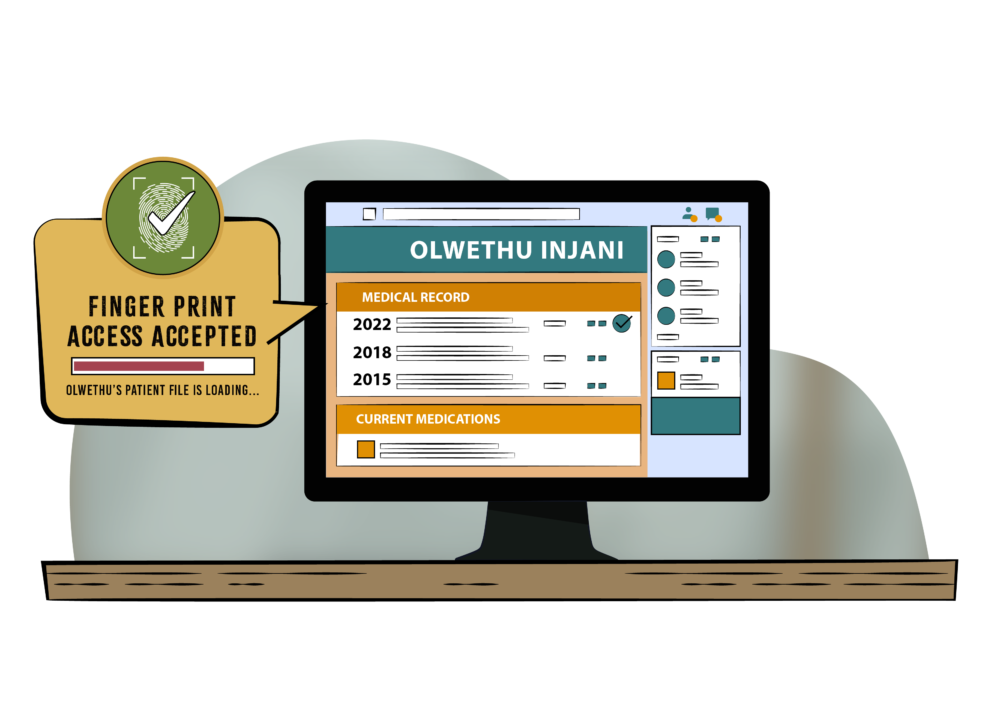Lifetime Biometric Files

Lifetime Biometric Files would consolidate all a seeker’s health files into one comprehensive patient file available via fingerprint at any public health clinic. This eliminates the need for taking a patient history at every engagement, a highly inefficient and often impractical task given the daily patient burdens of public health care professionals. It also ensures the system is managing the common reality that patients move around to different regions and care engagement points during a health event.
Both patients and health care professionals experience friction when attempting to access a patient’s full health records during a clinic visit. Migrating patient files from paper-based systems to digital records is an arduous, expensive process fraught with challenges for governments. ARC’s work points to system efficiencies and seeker benefits that should be factored into the investment evaluation.
Public system health care professionals rotate through clinic postings often, so unlike a GP who may know a patient over a lifetime, medical records are often their only link to a patient’s full health history.
Today, the need for biometric technology in healthcare in South Africa is even greater, owing to the persistent challenge in patient records keeping at healthcare facilities. In 2005, led by the National Health Department and backed by the private sector, a biometrics project was piloted in three provinces in South Africa with the aim of establishing a centralized database to reference and collect key medical information on patients’ behalf. Despite the good intentions of the project and the recognition of the key benefits of the technology, the adoption and implementation of biometrics in healthcare in South Africa remains an opportunity to explore, with the overwhelming majority of facilities relying on paper/file for patient record keeping.
In the future, advancement in biometrics and supporting security technologies — for instance advancements and cost reductions in cloud secure solutions- may improve the feasibility and viability of utilizing data more efficiently in public healthcare systems. Patients identification errors would be significantly reduced, eliminating the reputation and financial risks. Patient confidentiality and privacy to a lifetime of health information may also be unlocked as biometric systems evolve. Ultimately the goal is to reduce all frictions related to a health seekers medical history no matter where they choose to seek care.
For successful integration of biometric accessibility in health data systems, the following challenges must be considered:
Both providers and patients must be properly introduced to the technology to accelerate adoption. Currently, trust in governments, as we learned in ARC, was eroded by the health system response to the Covid-19 pandemic. Growing security concerns in banking fraud and ID theft are compounded by stigmatized health issues that require patient confidentiality. It is fair to predict users and policy makers may receive novel interventions in healthcare data access with skepticism and reluctance.
Current system dysfunctions, while a pain to many, may also serve the goals and ends of key players, making it difficult for a national scale integration to occur without considerable resistance.
While some government departments are aware of the benefits of biometrics in healthcare, this information is not widely distributed and plans to adopt/integrate are not unified across departments. This slows down progress significantly.
The Covid-19 pandemic highlighted the sparse financial resources available to respond to health crises. Given competing health interests, such as the repair, maintenance and expansion of current health facilities, it may be difficult to advance proposals to integrate biometrics at a national level
In order to accelerate the integration of biometric technologies, the following key questions are worth considering:
-
How might we best introduce novel technologies such as biometrics to health seekers (particularly last mile populations who are not tech savvy) in a way that acknowledges failures in other systems (like banking)?
-
How might we ignite and inspire key political and policy figures to become champions of biometrics integration in healthcare?
-
How might we unlock novel health financing approaches to accelerate the adoption of lifetime data files in healthcare?